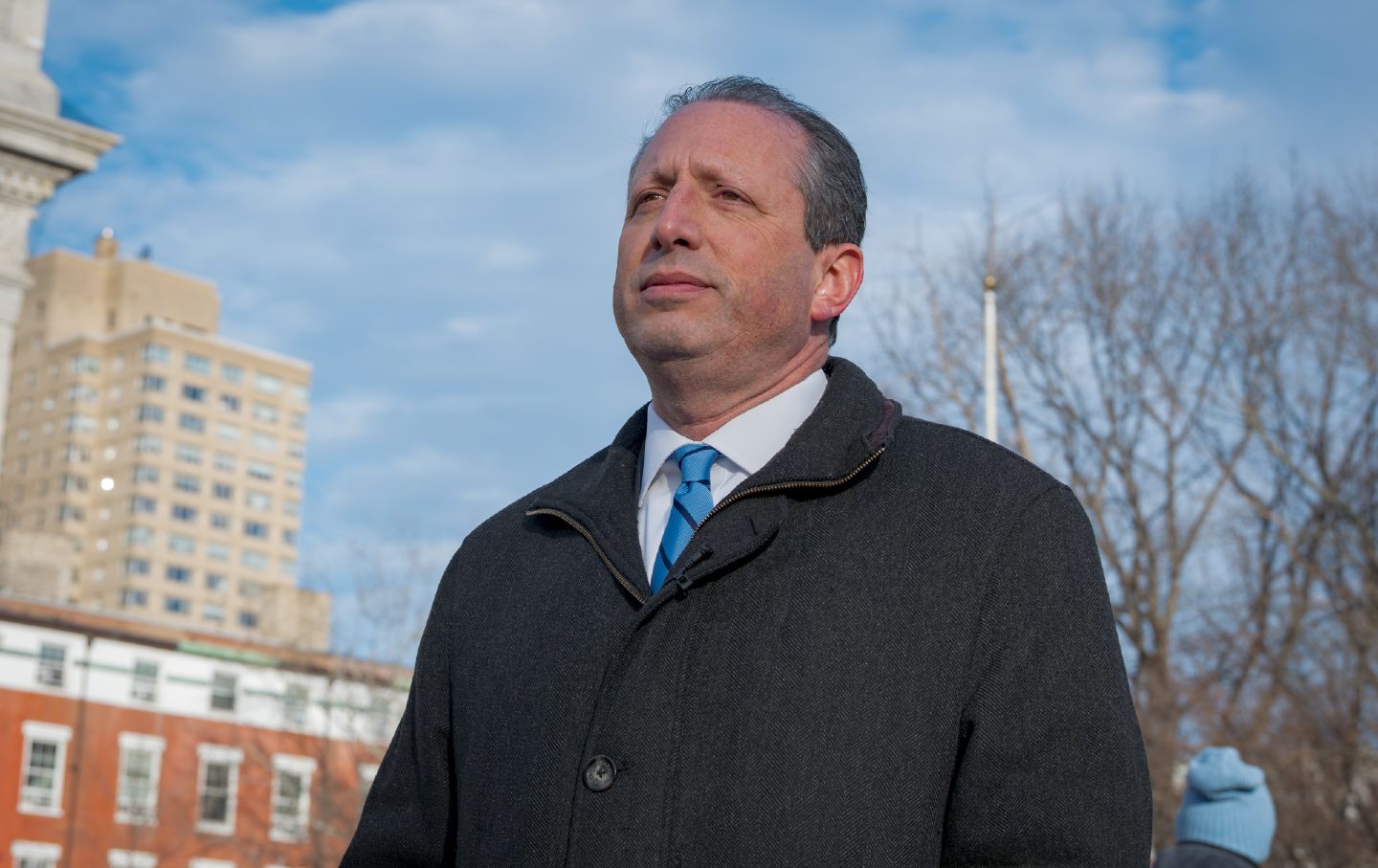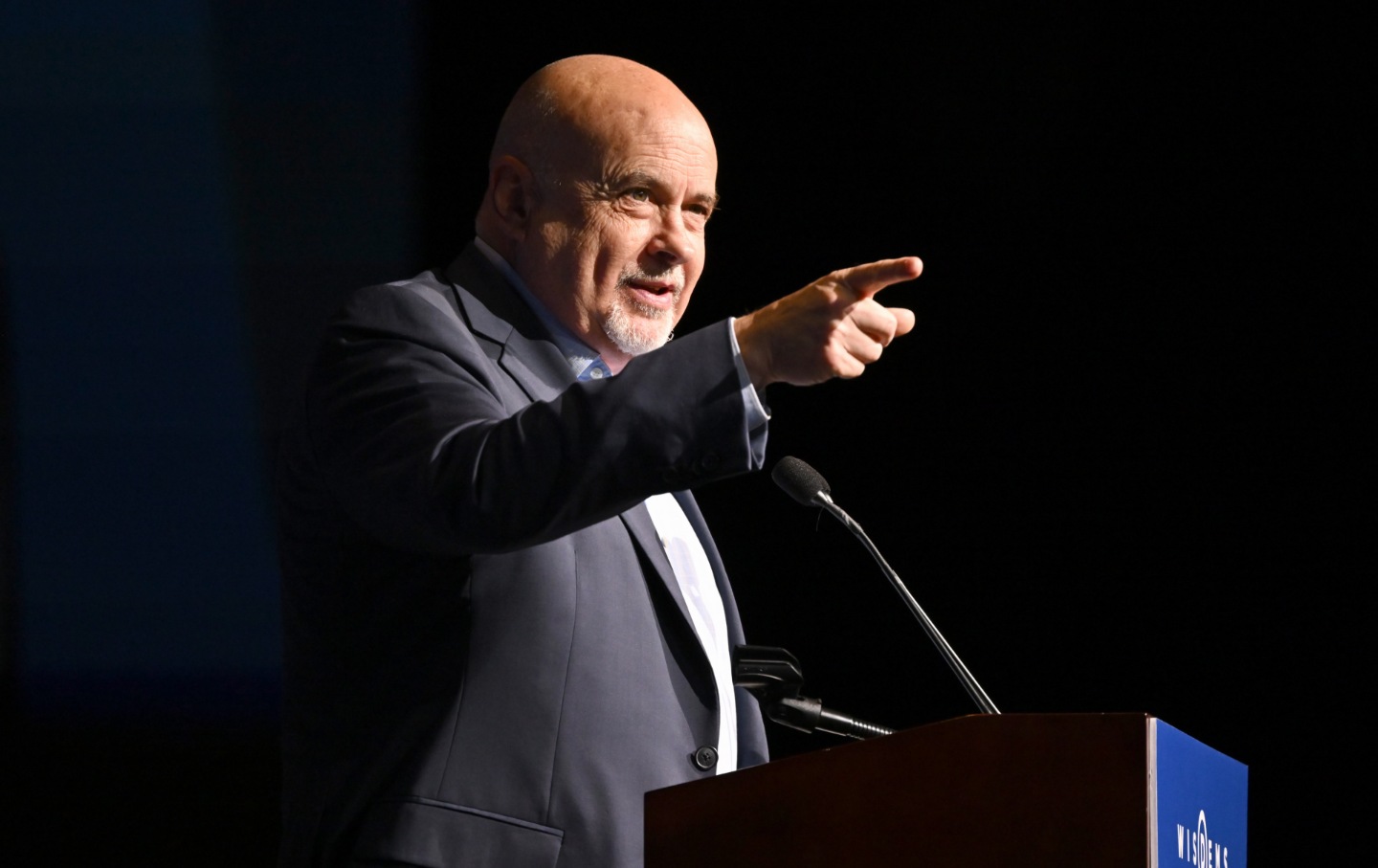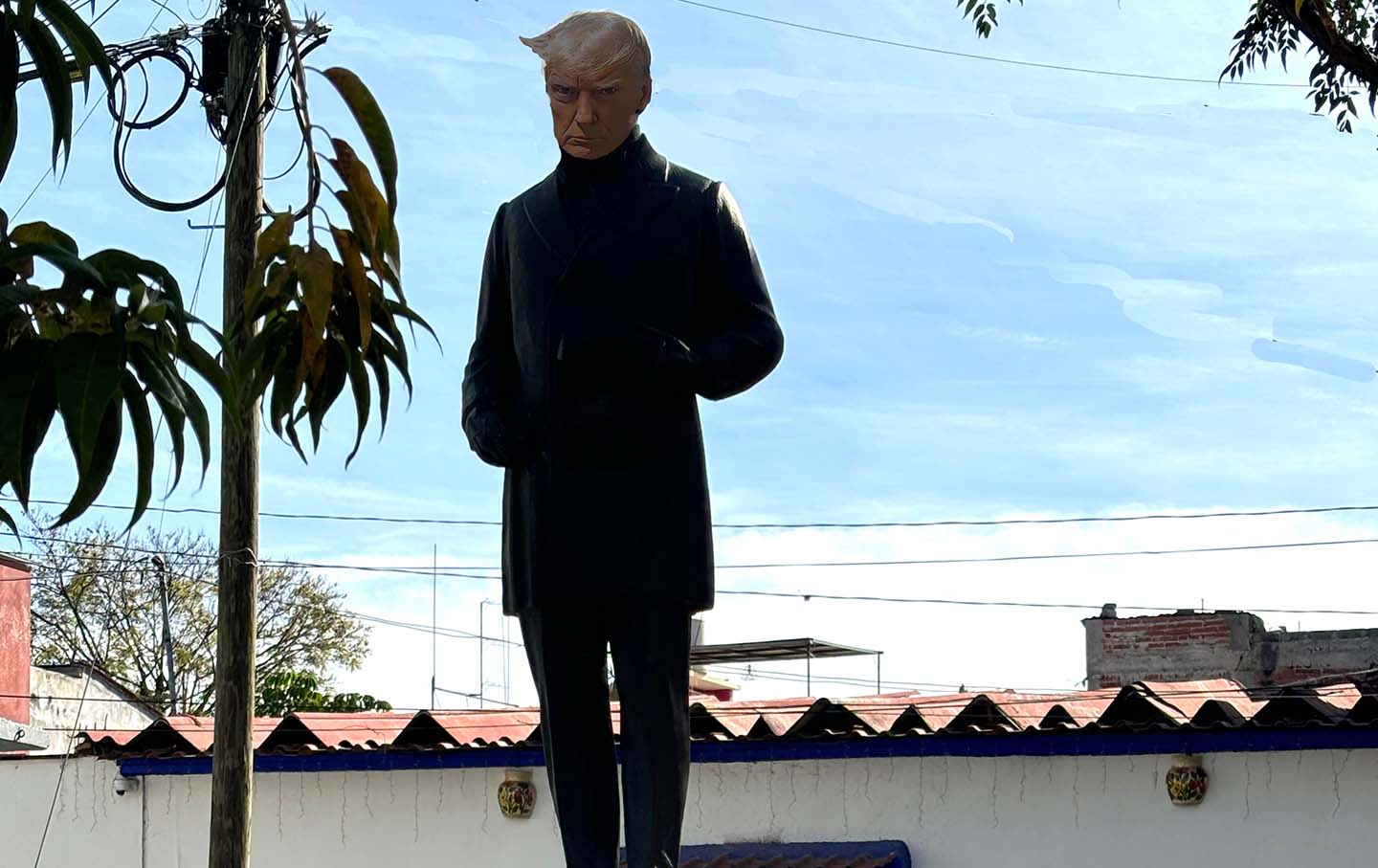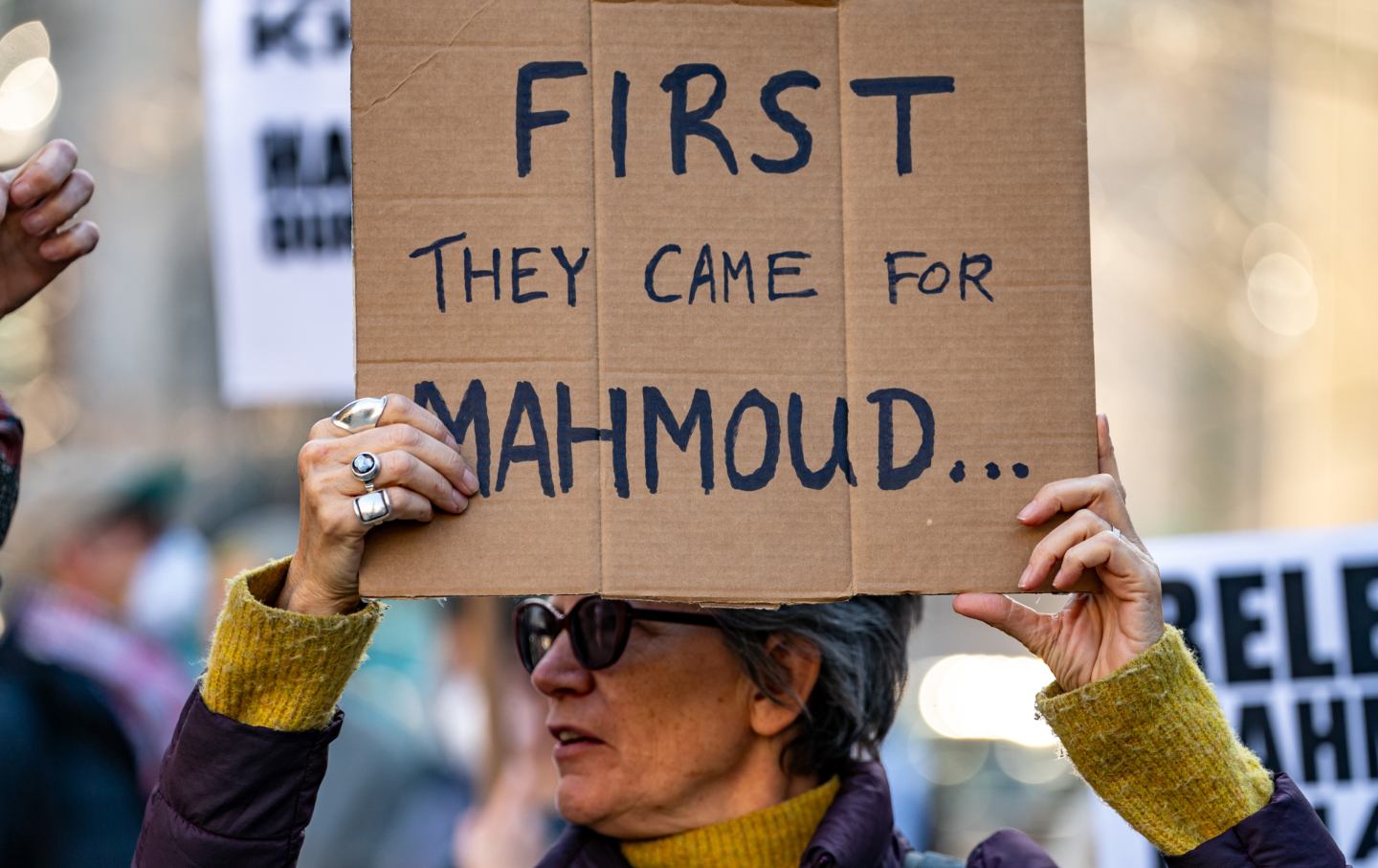How the Liberal Media Gave Us JD Vance
The months-long romance between Vance and an easily duped press in 2016 led directly to his sordid political rise.

Republican vice presidential nominee US Senator JD Vance (R-OH) speaks with the media at the airport before he departs on September 14, 2024, in Greenville, North Carolina.
(Allison Joyce / Getty Images)When Hillbilly Elegy was published during the homestretch of the 2016 election, its author, JD Vance, became the designated empath for a region and a marginalized cultural tradition—the hard-drinking, hard-fighting, and episodically hard-working Scotch-Irish peasantry in the American heartland. So it’s entailed no small amount of cognitive dissonance to see Vance, nine years later, promulgating what amounts to a blood libel against the Haitian community in Springfield, Ohio—the state he now represents in the US Senate—as he campaigns to be Donald Trump’s vice president. What’s more, Vance has urged his online MAGA following to continue spreading stories that he acknowledges may not be anything more than “rumors”—and admitted in a CNN interview that he would “create stories” to direct media attention to the MAGA narrative about immigration. That’s a level of cynical demagoguery that would make even Joe McCarthy blush.
Ugly hypocrisy abounds in this vile saga, as it does with much of the mythology and urban folk legends that make up the heart of the MAGA movement, from the “deep state” fantasias of Steve Bannon to the unhinged cosmic speculations of QAnon. Yet Vance’s willingness to radically revise and overwrite the lessons of his life story is by now a well-documented reflex; what’s more pivotal to his odyssey through public life is the voyeuristic liberal fascination with the tale of heroic uplift he spun in his reputation-making memoir.
Simply put, we wouldn’t have a potential Vice President JD Vance without that months-long liberal media romance with JD Vance, designated interlocutor from the country’s exotic hill country, nearly a decade ago. It’s worth reviewing that sordid history now, if only to see how we got to where we are.
The story begins, inevitably, with The New York Times, which published a fawning appreciation of Vance’s memoir by its reviewer Jennifer Senior in August 2016. (That review is not to be confused with the fawning appreciation published in the Sunday books section a few months later by freelance contributor and Vance-ian heartland whisperer Meghan Daum.) Senior exulted that, in the midst of a deranging national election cycle, Vance was
offering a compassionate, discerning sociological analysis of the white underclass that has helped drive the politics of rebellion, particularly the ascent of Donald J. Trump. Combining thoughtful inquiry with firsthand experience, Mr. Vance has inadvertently provided a civilized reference guide for an uncivilized election, and he’s done so in a vocabulary intelligible to both Democrats and Republicans.
Imagine that.
Senior was just getting warmed up. Vance, she declared, had boldly intervened in a polarized, blame-addicted discourse about the unequal condition of the country’s political economy with a message of “tough love and personal responsibility.” She portrayed the book as an oasis in an intellectual desert: “An investigation of voter estrangement has never felt more urgent, and we’re certainly not getting one from the lacquered chatterers on the boob tube.”
The key to Vance’s unvarnished truth-telling, Senior argued, was his firm line on the great American gospel of tough-minded self-help—a faith recently, and compellingly preached by Vance’s ideological opposite number, Barack Obama. This whole act of pundit projection bears quoting at length:
Squint, and you’ll note the incendiary nature of Mr. Vance’s argument. It’s always treacherous business to blame a group for its own misfortunes. Certainly, an outsider cannot say what Mr. Vance is saying to his kin and kind. But he can—just as President Obama can say to fellow African-Americans, “brothers should pull up their pants,” as he did on MTV.
The difference is that President Obama believes poverty, though it may have a cultural component, is largely a structural problem, one the government can play a large role in fixing. Mr. Vance, a conservative, takes a far dimmer view.
Whether you agree with Mr. Vance or not, you must admire him for his head-on confrontation with a taboo subject. And he frames his critique generously, stipulating that it isn’t laziness that’s destroying hillbilly culture but what the psychologist Martin Seligman calls “learned helplessness”—the fatalistic belief, born of too much adversity, that nothing can be done to change your lot.
The Obama parallel is especially telling here, since for a certain kind of impressionable well-heeled white liberal, the 44th president was also a designated interlocutor from a similarly unknown, and potentially threatening, subculture—the African American community. Obama, like Vance, came bearing the good news for well-off white liberals that the same social order that lavishly rewarded them wasn’t really the culprit behind his identity group’s despair and dysfunctions.
No, retrograde cultural attitudes and mores were holding these stubbornly unassimilated groups back—and, importantly, redistributive policies could do nothing to alter this set of self-undermining behaviors, steeped as they are in what Senior called “fatalistic belief.” It’s the same fable of cultural determinism that shaped Obama’s signature race initiative, the My Brother’s Keeper Alliance, an ostensible response to the racist Trayvon Martin shooting that was, in reality, a multibillion-dollar, corporate-backed effort to revive the culture-pathologizing handiwork of the Moynihan Report for the 21st century.
This pundit lullaby amounts to sizing up the genuine despair and anomie wrought by decades of deindustrialization and public neglect in the American interior with a weary, wised-up shrug. The overlapping economic grievances of the displaced white and Black working classes get reduced to the same self-insulating refrain: It’s their culture—a real shame, but nothing else to see here.
And so it went throughout Hillbilly Elegy’s long and dreary conquest of the liberal media. The Washington Post, no doubt hard-pressed to outdo the Times’ opening volleys of Vance sycophancy, elected to bypass the niceties of a formal review and published an excerpt from Vance’s memoir, limning the lost traditions of hillbilly patriotism, and exhorting the country to win back the sympathies of these scorned lovers of America.
A separate author interview had him making the same argument for the evangelical faith tradition he was reared in. In his no-less-inevitable star turn with Terry Gross on Fresh Air, Vance reprised the same basic culture-of-poverty refrains, along with some titillating asides, such as his youthful suspicion that UN General Secretary Kofi Annan could well be the Antichrist. Vance racked up so many interviews on MSNBC that he could have been mistaken for a daytime host. (He eventually landed a CNN contributor contract from 2017 to 2018, in his then-expedient guise as a thoughtful Never Trumper.)
This dismaying track record has now gone down the media industry’s memory hole, as many of the same outlets who championed Vance’s truth-telling brio are frantically racing to document his exposure as a bigoted, misogynistic, natalist—and now xenophobic—fraud. But Vance’s fraudulence was always hiding in plain sight for anyone who hasn’t already bought into the liberal media’s self-serving discourse of class exoticism.
Sarah Jones, who also came of age as an evangelical believer in a depressed rural community, wrote in one of the rare real-time dissenting reviews of Vance’s memoir that it was founded on a glaring lie about conditions in Appalachia and other redoubts of white-working class suffering. “In Elegy, Vance complains about hillbillies who he believes purchased cellphones with welfare funds. But data makes it clear that our current welfare system is too limited to lift depressed regions out of poverty,” she wrote, saying further on:
Popular
“swipe left below to view more authors”Swipe →If you are born where I grew up, you have to travel hundreds of miles to find a prosperous America. How do you get off the dole when there’s not enough work to go around? Frequently, you don’t. Until you lose your benefits entirely: The Temporary Assistance for Needy Families program (TANF), passed by Bill Clinton and supported by Hillary Clinton, boots parents off welfare if they’re out of work.
Most of the media industry was, to say the least, badly placed to handle such discomfiting truths. But all those rich liberals proved to be perfect marks for Vance’s narrative, which, by doting on family dysfunctions and short-circuited work ethics, fell cleanly into the broader template of the adversity memoir—which, as I wrote long ago for this magazine, had unleashed a slew of fraudulent accounts of personal, racial, and economic despair redeemed by Vance-like striving and tough love.
Indeed, Hillbilly Elegy’s own origin story bears eloquent testimony to such ineluctable market forces. Vance was reportedly put on to the project of writing his life story by his Yale Law School adviser, Amy Chua, who after an initial middling tour as a policy intellectual, hit it big with a tell-all memoir about the draconian child-rearing regimen she mastered as an Asian “Tiger Mom.” Her follow-up book was a joint effort with her husband, another Yale Law School prof, purporting to—yes—explain the success of various ethnic groups by virtue of their cultural allegiances.
On the off chance that the American culture industry wants to set out on the long path toward rectifying its endemic class and racial blind spots, it so happens that the Vance saga offers a perfect opportunity. At the outset of Hillbilly Elegy, Vance provides a thumbnail history of his clan’s migration from Kentucky to Middletown, Ohio, where he grew up. The leaders of the local steel industry recruited Appalchian transplants there to work as steel rollers, largely on the basis of their storied work ethic and piety. That’s also how Springfield, Ohio, wound up serving as the home of the Haitian migrant community that is now being so despicably traduced by Vance; the city’s leaders invited them to move there, in many instances to work in the self-same southwestern Ohio steel industry.
So let’s do the math here: One group of migrant workers comes into the region, sets down roots, and, in spite of a regional history of violence and substance abuse troubles, gets lauded as the forgotten tribunes of a Real America, whom our social order must accommodate down to the particulars of its worship habits and imperfectly requited love of country. The other group becomes the subject of a vicious blood libel, is forced to stay indoors and pull its kids from school for fear of vigilante retribution, while the leaders of a major political party call for more, and now demand their mass deportation—even though the vast majority of them are in the country legally. Gee, what do you suppose the cultural reason for that might be, Jennifer Senior and Terry Gross?
Support independent journalism that exposes oligarchs and profiteers
Donald Trump’s cruel and chaotic second term is just getting started. In his first month back in office, Trump and his lackey Elon Musk (or is it the other way around?) have proven that nothing is safe from sacrifice at the altar of unchecked power and riches.
Only robust independent journalism can cut through the noise and offer clear-eyed reporting and analysis based on principle and conscience. That’s what The Nation has done for 160 years and that’s what we’re doing now.
Our independent journalism doesn’t allow injustice to go unnoticed or unchallenged—nor will we abandon hope for a better world. Our writers, editors, and fact-checkers are working relentlessly to keep you informed and empowered when so much of the media fails to do so out of credulity, fear, or fealty.
The Nation has seen unprecedented times before. We draw strength and guidance from our history of principled progressive journalism in times of crisis, and we are committed to continuing this legacy today.
We’re aiming to raise $25,000 during our Spring Fundraising Campaign to ensure that we have the resources to expose the oligarchs and profiteers attempting to loot our republic. Stand for bold independent journalism and donate to support The Nation today.
Onward,
Katrina vanden Heuvel
Editorial Director and Publisher, The Nation
More from The Nation

Breaking Democracy Breaking Democracy
Shredding the Constitution and Rule of Law.

NYC Mayoral Candidate Brad Lander Lays Out His Plan to Uplift the City’s Workers NYC Mayoral Candidate Brad Lander Lays Out His Plan to Uplift the City’s Workers
The New York City comptroller is releasing a workers’ rights platform, which he shared exclusively with “The Nation.”

This Democrat Is Giving a Master Class in How to Shame the GOP This Democrat Is Giving a Master Class in How to Shame the GOP
A Republican congressman was avoiding his constituents. So Democrat Mark Pocan gave them a chance to speak their mind.

Making Enemies With the World Making Enemies With the World
Trump’s anti-immigrant position is devastating lives.

The Agony of JD Vance The Agony of JD Vance
The vice president's main job appears to be to embody the banshee scream of a dying order.

14 House Dems Demanded Mahmoud Khalil’s Release. Where Are the Others? 14 House Dems Demanded Mahmoud Khalil’s Release. Where Are the Others?
All members of Congress swore oaths to defend the right to speak freely and assemble to petition for the redress of grievances. Why did so few of them sign this important letter?


